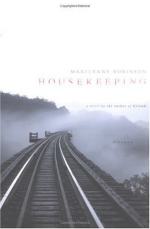|
This section contains 11,400 words (approx. 38 pages at 300 words per page) |

|
SOURCE: Foster, Thomas. “History, Critical Theory, and Women's Social Practices: ‘Women's Time’ and Housekeeping.” Signs 14, no. 1 (autumn 1988): 73-99.
In the following essay, Foster examines Julia Kristeva's feminist critique of women's liberation in her essay “Women's Time” and applies Kristeva's theoretical perspective toward a critical analysis of Robinson's Housekeeping.
The value of the deconstructive critique to feminist theory and the form it should take within a political reading practice continue to be debated by feminist critics.1 However, the relevance of Julia Kristeva's essay “Women's Time” to this debate has not been generally acknowledged.2 “Women's Time” offers a historical model of recent developments in the women's movement, a model that presents feminist expropriation of deconstruction as a possibility generated by (at least) Western women's historical situation. Kristeva suggests that there is a material basis for feminist use of deconstructive strategies, but her model of the forms feminist self-consciousness can take...
|
This section contains 11,400 words (approx. 38 pages at 300 words per page) |

|


